by al-monitor.com — The Lebanese government announced today a new electricity deal with Syria and Jordan. Lebanon’s Water and Energy Minister Walid Fayad signed the agreement with his Syrian and Jordanian counterparts, Ghassan al-Zamel and Saleh al-Kharabsheh. The deal will send 250 megawatts of electricity from Jordan and Syria into Lebanon, the official National News […]
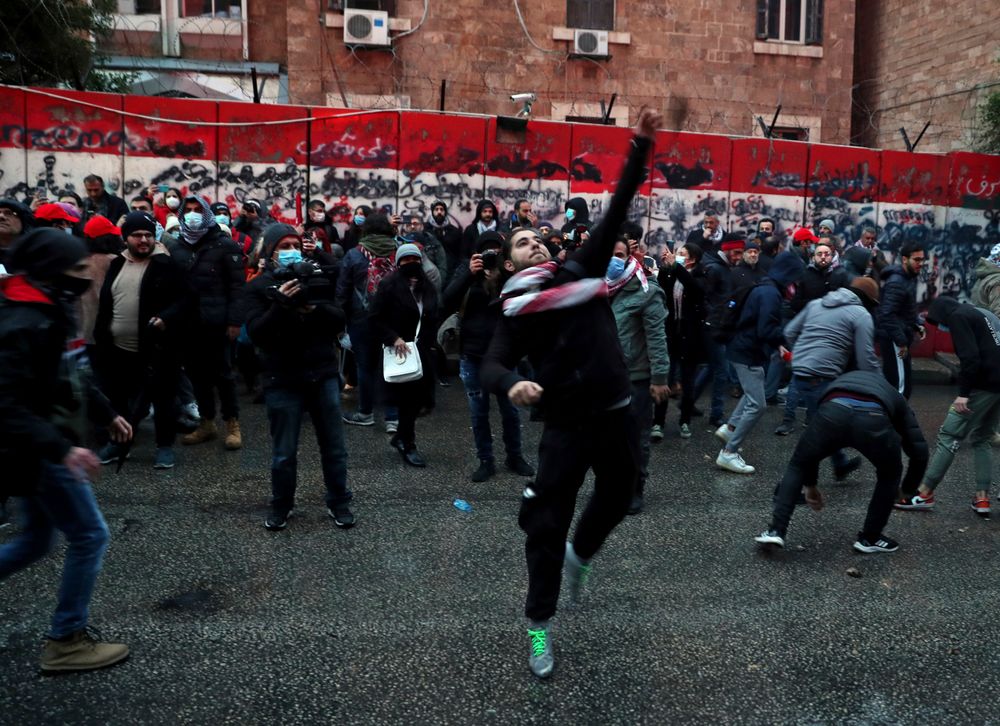
BEIRUT (AP) — Lebanon’s economy contracted by more than 58%, the World Bank said Tuesday, warning in a report that the small country’s financial meltdown poses a threat to long-term stability and social peace. It accused Lebanese leaders of being indifferent to the nation’s economic collapse, refusing to adopt a credible recovery plan and begin implementing reforms. The World Bank’s Lebanon Economic Monitor showed the country’s gross domestic product plummeted from close to $52 billion in 2019 to a projected $21.8 billion in 2021, marking the biggest contraction of the 193 countries listed by the publication. “The scale and scope of Lebanon’s deliberate depression are leading to the disintegration of key pillars of Lebanon’s post-civil war political economy,” said the report, titled, “The Great Denial.” The meltdown began in October 2019 and has thrown more than 75% of the country’s population into poverty. The same political class blamed for the decades of corruption and mismanagement leading up to the crisis has done almost nothing to help Lebanon climb out of the crisis.
The Lebanese pound has lost more than 90% of its value and there are several exchange rates, reflecting the severity of the crisis. Banks have imposed informal capital controls, depriving people of access to their savings. Despite spending billions of dollars on infrastructure projects since the civil war ended in 1990, electricity cuts out for 22 hours a day, tap water is largely undrinkable, roads are riddled with holes, trash piles on the streets while the sewage system floods whenever there is heavy rain. The report, which analyzes the end of 2021, estimates a decline of the GDP by 10.5% percent for that year. That comes after a 21.4% contraction in 2020. It lined up with earlier reports that said the crisis is one of the world’s most severe economic collapses in modern times. Lebanon’s surging inflation, estimated to average 145% in 2021, now ranks third globally after Venezuela’s and Sudan’s, it said.
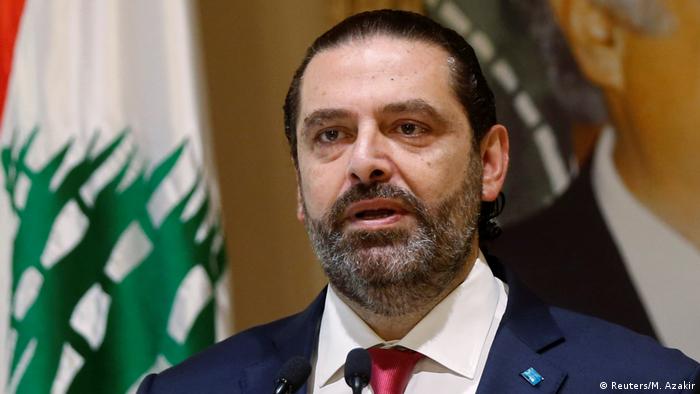
By Kareem Chehayeb — aljazeera — Beirut, Lebanon – Former Prime Minister Saad Hariri has announced that he will suspend his involvement in political activities and will not run in upcoming parliamentary elections. The Hariri family has dominated Lebanon’s Sunni political landscape for more than three decades since the end of the country’s civil war in 1990. In Lebanon’s sectarian system, where parliamentary seats are allocated based on a sectarian quota, the vast majority of Sunni lawmakers are part of Hariri’s Future Movement party. “I’m convinced there is no room for any positive opportunities to Lebanon due to the Iranian influence, our indecisiveness with the international community, internal divisions, and sectarian divisions, I’m suspending work in political life and so is the Future Movement. And I’m not running in the elections, nor will the Future Movement,” Hariri said in a televised address on Monday. “We are staying in service of our people and nation, but our decision is to suspend any direct role or responsibility in ruling, representation, or politics in the traditional sense,” he added.
Parliamentary elections are slated for May 15, 2022. Lebanese will head to the polls for the first time since a countrywide popular uprising in late 2019, and the Beirut Port blast in August 2020 that killed more than 200 people and flattened several neighbourhoods in the capital. Lebanon is also reeling from a continuing economic crisis that has slipped more than three-quarters of the population into poverty in a little more than two years. Hariri said on Monday that his goal was to prevent another Lebanese civil war amid growing tensions and to improve the wellbeing of Lebanese, and said compromises he has made with political adversaries to prevent war has weakened his ability to improve the economy. “These agreements came at my expense, and could be the reason of my inability to make life better for the Lebanese. History will be the judge of that,” he said, citing loss of personal wealth, local and regional allies.
إنّ احجام أي طائفة عن المشاركة في الانتخابات النيابية، ترشيحاً او اقتراعًا، او تدني نسبة مشاركتها بشكل ملحوظ، ليس فشلًا للديمقراطية فحسب بل وأيضًا هو تشويهٌ لصيغة العيش الواحِد المشترك. فلا يظنن احدٌ أنّ الخسارة تلحق بالطائفة المعنية فقط بل بالتأكيد بكل الطوائف والمكوّنات، شأن الخسارة التي تكبدها لبنان عام ٩٢ حين قاطع المسيحيّون بمعظمهم […]
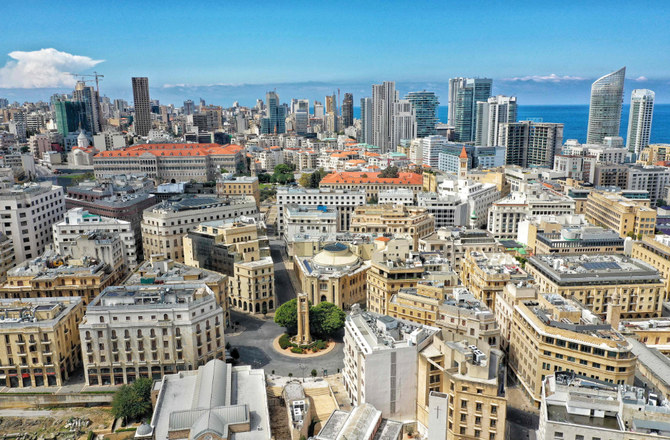
BEIRUT (Reuters) – Lebanon is suffering an economic meltdown that began in 2019 when the financial system collapsed under colossal state debts and the unsustainable way they were funded, while politicians have yet to come up with a rescue plan.
Just how bad is the situation?
– Gross domestic product has plunged to an estimated $20.5 billion in 2021 from about $55 billion in 2018, the kind of contraction usually associated with wars, the World Bank says, ranking the collapse as one of the worst globally since the mid-19th century.
– The Lebanese pound has lost more than 90% of its value, driving up the cost of almost everything in a country reliant on imports, and demolishing purchasing power. A soldier’s monthly wage, once the equivalent of $900, is now worth about $50.
– Poverty rates are sky-rocketing in the population of about 6.5 million, with around 80% of people classed as poor, the U.N. agency ESCWA says. The situation is worsening. In September, more than half of families had at least one child who skipped a meal, UNICEF has said, compared with just over a third in April.
By STEVEN GANOT — themedialine.org — The Nabu Museum in northern Lebanon returned five Roman antiquities to Syria on Thursday, after they had been on display since 2018. Art collector Jawad Adra had bought the pieces, including limestone statues and carved funerary stones dating back to the second and third centuries CE, from a European […]
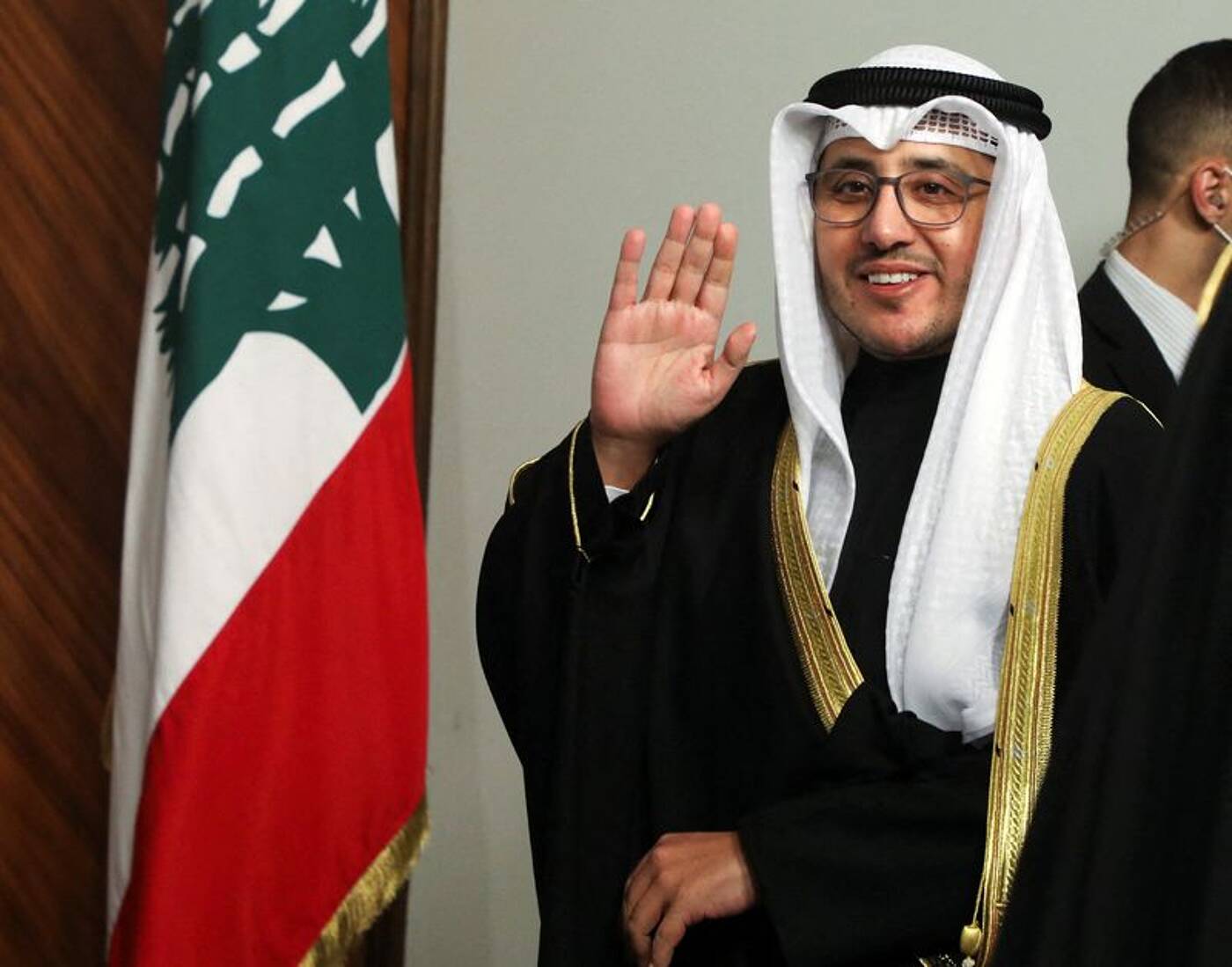
BEIRUT (Reuters) -Kuwait’s foreign minister said on Sunday Lebanon must not be a platform for hostile acts or words toward Gulf Arab states, an indirect call for curbs on the Iran-backed group Hezbollah in order to improve strained ties. Kuwaiti Foreign Minister Sheikh Ahmad Nasser al-Mohammad al-Sabah spoke after meeting President Michel Aoun in Beirut, during the first visit https://www.reuters.com/world/middle-east/lebanons-pm-meet-kuwaiti-foreign-minister-beirut-2022-01-22 to Beirut by a senior Gulf Arab official since a diplomatic rift last year. Sheikh Ahmad said on Saturday he had delivered confidence-building proposals to Prime Minister Najib Mikati, and that his trip was coordinated with Gulf states. “We asked that Lebanon not be a platform for any aggression – verbal or actual,” Sheikh Ahmad said after meeting Aoun. “I presented ideas and thoughts … And we are awaiting a response,” he added.
Diplomatic sources told Reuters that among the 12-point proposals was that Lebanon commits to the 1989 Taif Agreement that ended Lebanon’s civil war, tightens border controls to prevent drug smuggling to the Gulf and steps up security cooperation. The Gulf initiative expressed hope that Beirut will respond by end of the month during a meeting of Arab foreign ministers in Kuwait. Lebanon’s ties have long been strained by the influence of the heavily armed Shi’ite group Hezbollah, and were plunged into a new crisis in October by comments from a former Lebanese minister criticizing Saudi-led forces fighting the Iran-aligned Houthi movement in Yemen. Kuwait was one of several members of the Gulf Cooperation Council (GCC), including Saudi Arabia, that responded to George Kordahi’s remarks by expelling the Lebanese ambassador and recalling its envoy to Beirut.
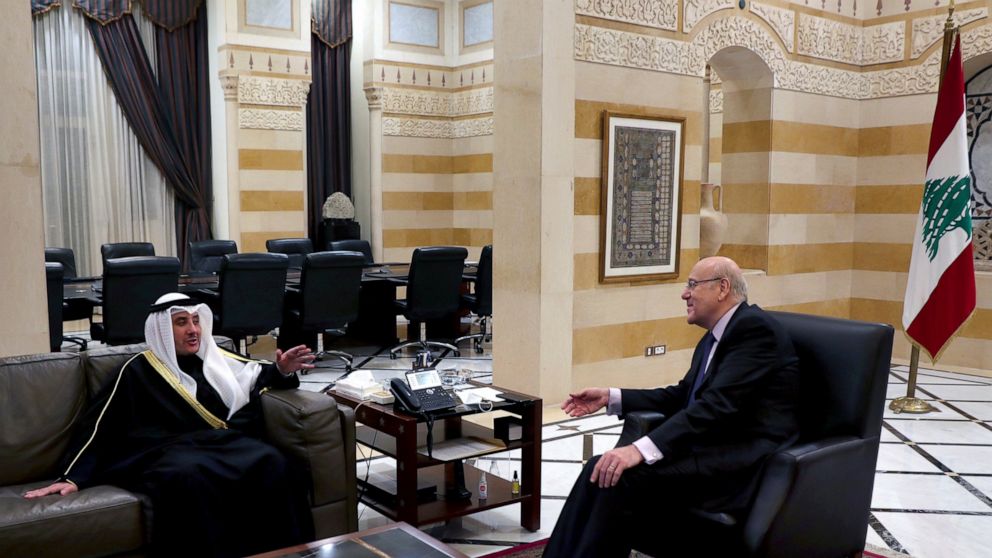
by aljazeera.com — Gulf Arab states are looking to mend a standoff with Lebanon, Kuwait’s foreign minister said during a visit, the first by a senior Gulf official since the spat erupted last year. “This visit is one of various international efforts to restore trust with Lebanon,” Foreign Minister Sheikh Ahmed Nasser Al Mohammed Al Sabah said on Saturday after talks with Lebanese Prime Minister Najib Mikati at the start of a two-day trip. “We are now taking steps towards building trust … which doesn’t happen overnight,” he told reporters, calling on Lebanese authorities to take “practical and concrete measures” that could bolster ties. The minister said his visit was also to show solidarity with the Lebanese people, and that the move had been coordinated with other Gulf countries.
In October, Saudi Arabia and its allies suspended diplomatic ties with Lebanon after the airing of comments by the then Information Minister Georges Kordahi criticising a Saudi-led military intervention in Yemen. Kuwait recalled its ambassador from Beirut and also asked Beirut’s charge d’affaires to leave the emirate. Lebanon “should avoid interfering in the internal affairs of Arab states generally, but especially in Gulf internal affairs, and it should not be a launching pad for verbal or actual attacks” if it hopes to improve ties, Sheikh Ahmed said. The Kuwaiti official said he handed Mikati and his Lebanese counterpart Abdallah Bouhabib the demands and “now the brothers in Lebanon should study them and know how to deal with these matters and move ahead”. He refused to elaborate on what the demands are.
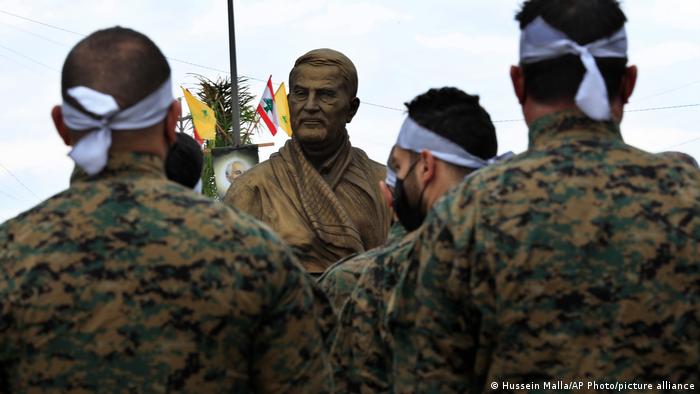
BEIRUT, Lebanon, By Dalal Saoud – upi.com — (UPI) — Lebanon’s financial collapse, which has pushed large segments of the population into poverty, has also seen growing anger against the powerful Hezbollah, with more voices openly blaming it for the ongoing crisis and for its allegiance to Iran. Hezbollah’s attempts to distinguish itself from the ruling corrupt political class, counting on its reputation as a resistance group that forced the withdrawal of Israeli occupying forces from south Lebanon in 2000 and battled the Islamic State in Syria, are no longer convincing to many, even to once loyal supporters. The group’s growing dominance in internal politics, engagement in regional wars and in thwarting the 2019 popular uprising is tarnishing its image as the nation’s defender, critics say. With a freezing winter, a continued 22-hour-a-day power cut, lack of diesel fuel and medicines coupled with exorbitant food prices, priorities are shifting to feeding the family, keeping warm, securing medical treatment or simply making ends meet.
U.S. sanctions 3 Lebanese businessmen, tourism company for aiding Hezbollah The poverty rate has nearly doubled — from 42% in 2019 to 82% in 2021, according to the United Nations Economic and Social Commission for Western Asia. Over two years, the national currency has lost 90% of its value while the country witnesses a dramatic collapse in basic services, an unemployment surge and closure of businesses. Not spared from the hardship, complaints within Hezbollah’s own community are not hidden anymore. “More and more people are expressing their discontent openly,” said a Shiite woman, in her 60s from the Baalbeck region, a Hezbollah stronghold in eastern Lebanon with the highest number of the group’s fighters killed in the Syria war. “They live day by day and are busy securing the basic things, like bread and diesel fuel.”

By Najia Houssari — arabnews.com — BEIRUT: Just four people have submitted their candidacies for Lebanon’s parliamentary elections planned for May since the nomination process opened on Jan. 10. The next house of representatives will elect a new president in October, five months after the parliamentary elections. Some 250,000 Lebanese expats have registered abroad to vote in the upcoming elections to choose 128 MPs. Only one-third of them registered for the previous elections, reflecting enthusiasm for change. Zeina Helou, an expert in local affairs, told Arab News that those who submitted their candidacies belonged to the opposition. Helou said there was a delay in the process because opposition figures had been questioning the possibility of parliamentary elections going ahead. There were further delays due to the electoral law requiring candidates to join electoral lists to qualify as a contestant.
The parliamentary elections are expected to be heated as the Lebanese people are motivated for political upheaval in a system accused of corruption. Candidates are also required to deposit LBP30 million ($19,800), which is far higher than the LBP8 million deposit for previous parliamentary elections. Helou said that things might take shape when registration of the candidates’ lists begins, with the deadline set between Mar. 16 and April 4. Amid the low candidacy numbers, the ruling political forces were still studying the possibility of maintaining their electoral allies, with several alliances broken up as a result of the political crisis.



